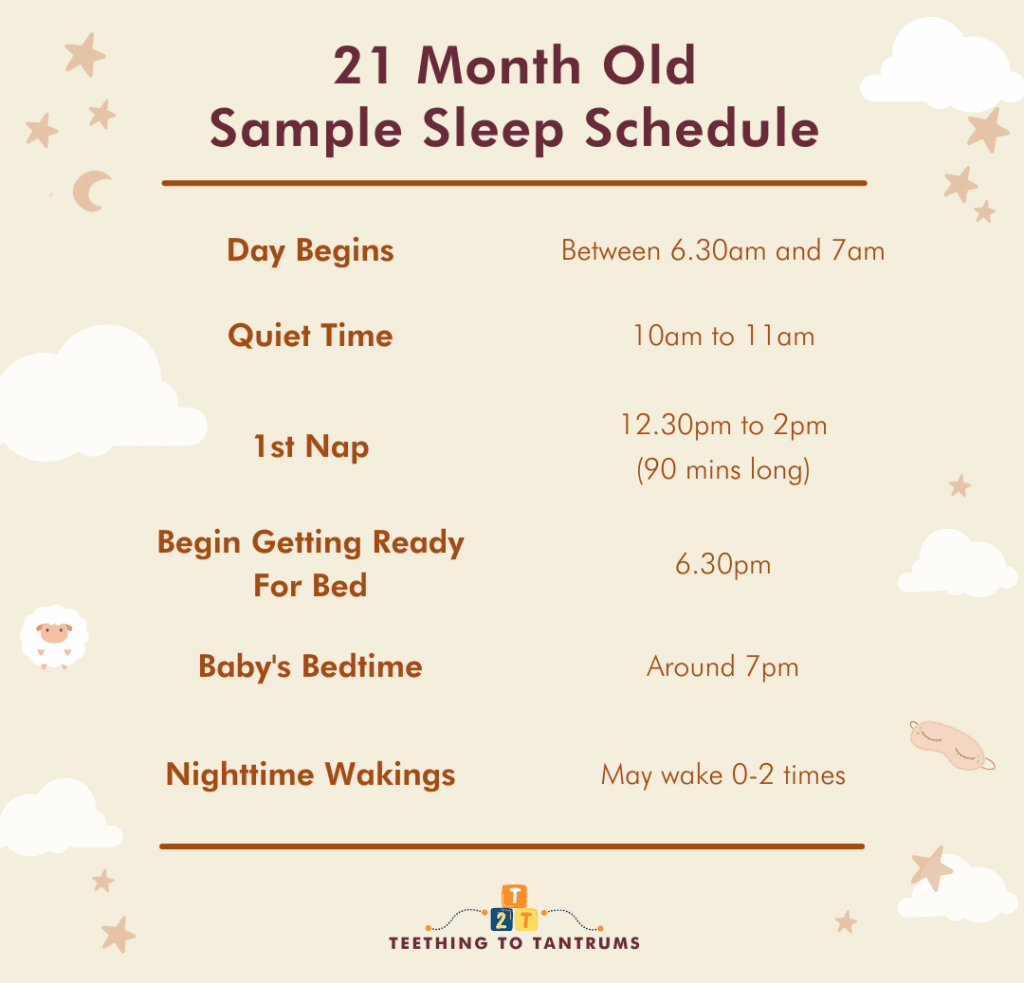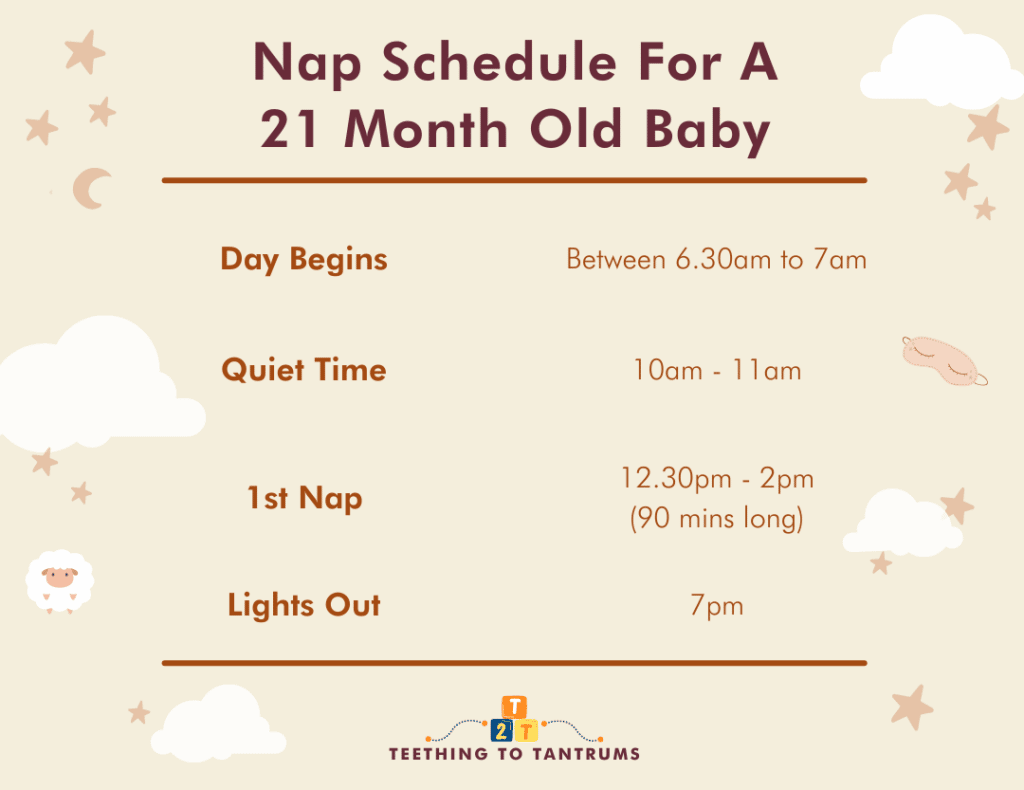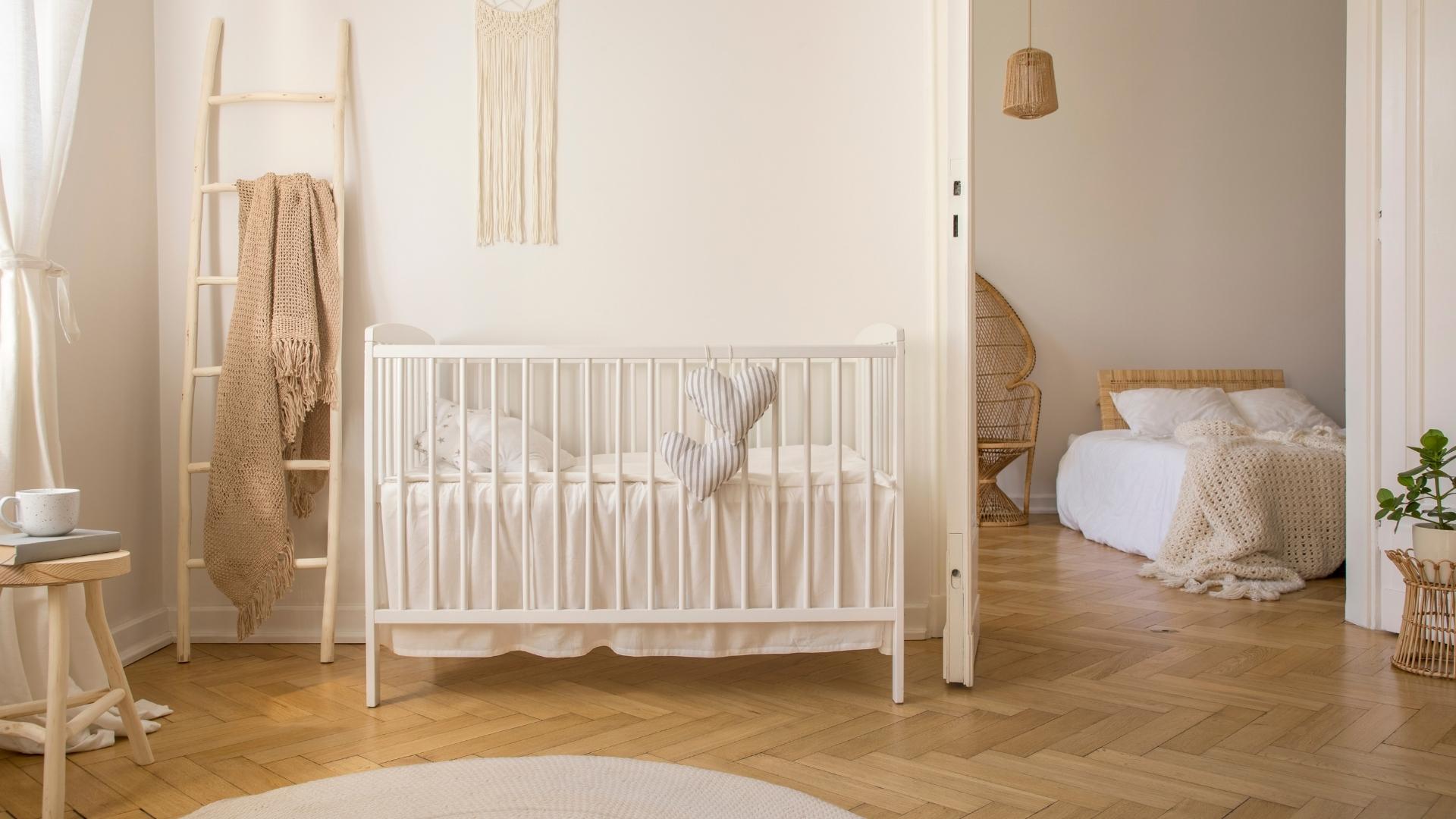Healthy sleep patterns start with a schedule. Here’s how to get your little one onto a regular 21 month old sleep schedule with top tricks to make maintaining it as easy as possible.
How Much Should A 21 Month Old Sleep?
Your average 21 month old will need around 12 ½ hours of sleep in a 24 hour period. Most of this will be taken at night with 1 daytime nap in the afternoon lasting about 1 ½ hours long.
Sample 21 Month Old Sleep Schedule
By 21 months old, your little one will easily be sleeping through the night and will have transitioned down to 1 nap in the afternoon (lasting about an hour and a half) on most days.
Here is a sample 21 month old sleep schedule to give you a guideline for how your little one’s day can flow:

REMEMBER: This 21 month old sleep schedule is only a guideline and will differ from child to child. The most important thing to focus on is how much sleep your little one requires in 24 hours and work from there.
Nap Schedule For 21 Month Old
By 21 months old, your child will have 1 nap a day but may need an extra one on very busy days.
To help you plan a nap schedule for your 21 month old, I would always advise having some quiet time in the morning to relax and maintain a consistent afternoon nap to avoid your little one from becoming overtired at the end of the day.

How Long Should A 21 Month Old Nap?
Most 21 month old’s will now be taking 1 afternoon nap which should last between 1 ½ to 2 hours.
REMEMBER: Nap timings depend on your child, how much they slept the night before and how busy their day has been.
How Many Naps Should A 21 Month Old Take?
As part of their 21 month old sleep schedule, your toddler will be taking one afternoon nap per day.
TOP TIP: It’s fine if your toddler takes a cat nap in the car on the way home from a busy day… However, make sure you wake them when you get home as you should not let them sleep for too long too close to bedtime.
21 Month Old Bedtime Routine
As always, a regular and healthy bedtime routine is essential to your child’s good night’s sleep as they are proven to improve sleep and reduce nighttime wakings. And for a 21 month old sleep schedule, your little one’s bedtime routine will consist of:
- Having a calm dinner time,
- Followed by a warm and calm bath,
- Cosying up together with a suitable book,
- Having a drink,
- And finally, settling down to sleep in their crib in a dimly lit room.
The entire bedtime routine should start between 6pm and 6.30pm and ideally, take no longer than 30 minutes.
REMEMBER: The bedtime routine should follow the same steps and be repeated at the same time every evening to ensure your 21 month old can recognise the signs that bedtime is coming to help them settle and fall asleep more easily. You can use a bedtime routine chart to help your little one know what’s coming up.
What Time Should A 21 Month Old Go To Bed?
For a 21 month old sleep schedule, your little one should be in bed with the lights out by 7pm.
If you want to adjust your schedule to make bedtime a little later you must change your daily nap times accordingly.
But no matter what… your child should not be in bed any later than 8pm to ensure your toddler gets enough sleep to support their brain’s growth and development as well as their physical development.
Looking to get your little one to sleep quickly and effortlessly? Check out my Bedtime and Nap Cheat Sheet and master the art of making daytime naps and bedtimes as seamless as possible.
A bedtime & nap cheat sheet so good your little one will ask you to put them to bed...
Laura Williams "This is a life saver! I'm so glad I downloaded your bedtime & nap cheat sheet. My little one actually asked me to put him to bed last night! Unbelievable! Thank you so much!"
Click Here For The FREE Cheat Sheet
Is There A Sleep Regression At 21 Months?
Yes and no…
Sleep regressions are possible at any age and can be triggered by all sorts of developmental and environmental occurrences.
Whilst sleep regressions are more common at 4 months, 6 months, between 8 and 10 months, 12 months old and around 18 months old…
Your 21 month old can still experience a sleep regression.
So if your 21 month old sleep schedule is disrupted with your little one fighting sleep, increased nighttime wakings and restlessness then they are very likely experiencing a short-term sleep regression.
Read this post to help you navigate this situation: Sleep Regression: What, Why, Signs & Sanity-Saving Solutions.
21 Month Old Sleep Tips
Establishing and maintaining a 21 month old sleep schedule will make your day much easier to manage because after all… Everything starts and ends with sleep!
Here are some of my top sleep tips to make creating and maintaining a 21 month old sleep schedule as simple as possible.
- Get some fresh air every day. Fresh and natural light will help to regulate your baby’s melatonin levels and circadian rhythm. Taking your baby outside every day for a walk or simply sitting in the garden to play on a blanket will definitely help establish a healthy 21 month old sleep schedule.
- Try to avoid overtiredness. As your toddler becomes more active and stays awake for longer periods of time to explore and investigate their world it is very easy for them to become overtired, resulting in them fighting sleep. So, watch for sleep cues and ensure your little one has the correct amount of daytime sleep, quiet play times and a regular bedtime as a part of their 21 month old sleep schedule.
TOP TIP: Time spent quietly in their crib is an ideal way to navigate nap transitions. They may sleep, or they may not but having a quiet period without sleep is better than being busy.
- Encourage falling to sleep independently. If you have not done so already then encouraging your little one to fall asleep independently is now essential. Being able to fall asleep alone will help with bedtime settling and nighttime waking. If your little one is struggling try introducing a cuddly comfort toy or favourite blanket to keep them company or play some appropriate sleep-settling music.
The calming music and sounds combined with the super-soft fabric and rhythmic breathing motion of this otter-ly cuddly pal will help soothe and comfort your little one, at home or wherever you go. Plus, it's even machine washable for when the inevitable spillages and floor drops happen!
- Be consistent with how you treat nighttime waking. As your 21 month old is now on a well-established solid diet with 3 meals a day, they do not require feeding at night. Therefore, if your toddler wakes at night, wait a while to see if they will resettle and if necessary, go and comfort them without picking them up or talking.
- Offer a bedtime snack and milky drink. While your toddler should not be waking for feeds in the night at this age they may be hungry or thirsty. Ensuring they have enough to drink before bedtime (a milky drink is ideal) and maybe a banana will ensure that hunger or thirst are not the reasons for any nighttime waking.
- Introduce a night light. Introducing a night light can help alleviate separation anxiety and help your little one to self-settle. Some white noise machines come with built-in night lights but there are some lovely night lights out there that can also project onto the ceiling like this one:
Finding the right night light for your child can be quite a task. You want something safe, comforting, and practical. The Cozy Starry Night Light ticks these boxes, with eye-friendly warm lighting and an easy-to-use dimmer.
Its gentle glow makes it the best night light for feeding baby, diaper changes, or comforting your little one back to sleep.
As your baby grows the Cozy Starry Night Light's starry sky projection can provide comfort and gentle quiet time stimulation. Its soft lighting ensures a dreamy, peaceful environment, supporting your baby’s natural sleep cycle.
It really is a fantastic nightlight (at a very reasonable price!)
- Eye-friendly warm lighting with adjustable brightness.
- Includes a timer function for convenience.
- Projects a starry sky that is soothing for little ones.
- Rechargeable battery, so it's very portable.
- A USB adapter is not included for charging.
- The star projector is static without motion (however, this is ideal for very young babies and toddlers).
- Battery life varies based on the brightness settings.
- Offer something to play with when your little one wakes early. If your little one is waking early and does not want to go back to sleep keep some toys and books nearby that you can give them to play with while you return to bed for a while. This is a great habit to get into and encourages your baby to play independently when they wake up as they grow.
- Have a regular bedtime routine. I cannot emphasise how important it is to have a consistent bedtime routine as part of your 21 month old sleep schedule. Start the routine at the same time every day and aim to have your baby in bed at the same time each evening.
- Lower the energy at the end of the day. Prepare your toddler for sleep by not letting things get too exciting before bedtime. Keep your interactions calm and low-key with calm activities after teatime.
- No screens AT LEAST 1 hour before bed. At this age, you may be tempted to let your little one play with a screen device. My advice would be to not let this happen at such a young age… But if you do decide for your little one to have screen time they should not be on it at least 1 hour before bed as the blue light emitted from screens is proven to disrupt your child’s ability to sleep. Complete simple games with wooden toys or read books together instead.
Perfect for a budding chef, this set of wooden magnetized foods will encourage your little one to develop their fine motor skills by imitating chopping and preparing whilst creating a delicious imaginary dish for you to try!
Common 21 Month Old Sleep Problems
The most common sleep problems that your toddler may encounter when establishing and maintaining a 21 month old sleep schedule are:
- Experiencing a sleep regression.
- Early morning waking because they are more aware of the light and sounds that surround them or because they went to bed early.
- Restless settling because they are hyper from the day’s activities.
- Fighting sleep because they’re overtired due to the increase in physical activity.
- Crying when away from you due to separation anxiety.
- Nighttime wakings because they are thirsty or hungry or cannot self-settle back to sleep.
TOP TIP: To help with early morning waking try a toddler alarm clock like this one to help your toddler know when it is time to get up and when they should stay in bed.
MELLA is the #1 most backed kid's clock and all-in-one Ready to Rise children's sleep trainer designed to keep your kid in bed longer. MELLA is a sleep trainer, alarm clock, sleep sounds machine, night light and nap timer rolled into one adorable package!
Studies show that children do not fully understand the concept of time until around 8 years old, so MELLA uses colours and facial expressions to teach your kid when it's time for bed and when it's okay to wake up. With MELLA, your kid can learn to stay in bed longer, giving you more sleep!
21 Month Old Baby Sleep FAQs
Looking for more help with creating the perfect 21 month old sleep schedule? Find answers to the most common questions here.
Why Is My 21 Month Old Waking Up At Night?
If your 21 month old is waking at night there may be several causes. These include
- Teething.
- Discomfort from being too hot or too cold.
- Inability to self-settle.
- General discomfort from itchy clothing or having gas.
- Experiencing a sleep regression.
- Experiencing night terrors.
- Being overtired or overstimulated and hyper before bedtime.
Is 9pm Too Late For Toddler Bedtime?
Yes, 9pm is too late for a toddler’s bedtime.
I would always recommend that toddlers of this age should be in bed no later than 7.30pm.
At What Age Do Toddlers Stop Napping?
Most toddlers will stop napping between the ages of 3 and 5. However, there are a few who will drop their nap around their second birthday.
Most 21 month olds will be taking an afternoon nap and will struggle to get through the day without one.
How Can I Help My Toddler Sleep Through The Night?
To help your little one sleep through the night you need to maintain the following as part of your 21 month old sleep schedule:
- Maintain a regular and timely bedtime routine.
- Ensure they have adequate daytime sleep to avoid overtiredness.
- Teach your little one to self-settle.
- Teach your little one to fall asleep independently.
- Have healthy sleep support such as a white noise machine, audio tapes and night light.
- Limit screens before bed.
- Keep nighttime interactions unengaging.
Sleep Schedules Further Reading
Here are some more sleep schedules to help you get the most out of helping your little one sleep as best they can.
After all…
Sleep breeds sleep!
- Newborn Sleep Schedule
- 1 Month Old Sleep Schedule
- 2 Month Old Sleep Schedule
- 3 Month Old Sleep Schedule
- 4 Month Old Sleep Schedule
- 5 Month Old Sleep Schedule
- 6 Month Old Sleep Schedule
- 7 Month Old Sleep Schedule
- 8 Month Old Sleep Schedule
- 9 Month Old Sleep Schedule
- 10 Month Old Sleep Schedule
- 11 Month Old Sleep Schedule
- 12 Month Old Sleep Schedule
- 13 Month Old Sleep Schedule
- 14 Month Old Sleep Schedule
- 15 Month Old Sleep Schedule
- 16 Month Old Sleep Schedule
- 17 Month Old Sleep Schedule
- 18 Month Old Sleep Schedule
- 19 Month Old Sleep Schedule
- 20 Month Old Sleep Schedule
- 21 Month Old Sleep Schedule
- 22 Month Old Sleep Schedule
- 23 Month Old Sleep Schedule
- 2 Year Old Sleep Schedule
- 30 Month Old Sleep Schedule
- 3 Year Old Sleep Schedule
Need More Parenting Help?
- Download our FREE Bedtime & Nap Sleep Cheat Sheet. It’s a free, easy-to-use and proven formula designed for parents of 0-5 year olds to master the art of consistently undisturbed and restful sleep without the yelling, nagging or exhausting long-winded evenings.
- Check out our Parenting Toolbox. You’ll get access to expertly-chosen products that you can guarantee are the best for your little one and your wallet.
- Are you looking for personalized guidance to navigate the challenges of parenting? I offer 1-on-1 consultations to bring you tailored strategies and actionable advice to help support your child's growth and well-being with confidence.

A bedtime & nap cheat sheet so good your little one will ask you to put them to bed...
Laura Williams "This is a life saver! I'm so glad I downloaded your bedtime & nap cheat sheet. My little one actually asked me to put him to bed last night! Unbelievable! Thank you so much!"
Click Here For The FREE Cheat Sheet






